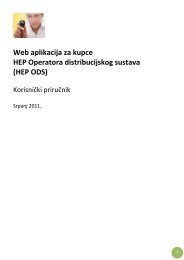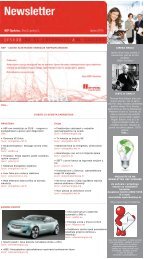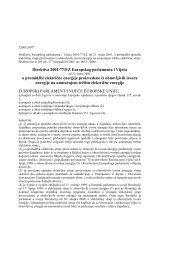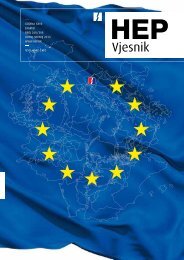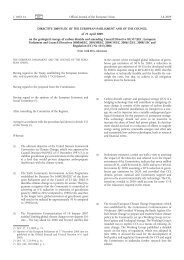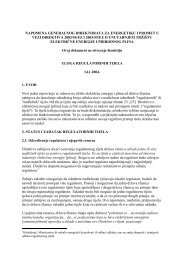You also want an ePaper? Increase the reach of your titles
YUMPU automatically turns print PDFs into web optimized ePapers that Google loves.
sigurnosti, zapoπljavanja i razvoja rjeπenja s velikim<br />
potencijalom tehniËko-gospodarskog poboljπanja),<br />
odabran je pristup po kojem su ti elementi<br />
zapravo egzogena ograniËenja, odnosno elementi<br />
Ëiju vaænost odreappleuje politiËka vlast.<br />
Jednim dijelom to vrijedi za ekoloπke ciljeve,<br />
poglavito kad je rijeË o klimatskim promjenama<br />
koje se povezuju s efektom staklenika izazvanim<br />
emisijama stakleniËkih plinova, premda je stupanj<br />
znanstvene sigurnosti da je upravo o tome rijeË<br />
joπ uvijek priliËno nizak. Odabir po kojem se<br />
s problemom proizvodnje elektriËne energije<br />
iz obnovljivih izvora energije, kogeneracije i<br />
energetske uπtede treba suoËiti kao s pitanjem<br />
istraæivanja u cilju pronalaæenja minimalnog ukupnog<br />
troπka (proizvodnog i ekoloπkog) nije meappleutim<br />
uobliËen kroz neki eksplicitni matematiËki model,<br />
nego Êe se izloæiti kroz razmatranje pojedinih<br />
hipoteza.<br />
ZakljuËno moæe se reÊi kako su hipoteze koje Êe<br />
se iznijeti na tragu sljedeÊeg naËela: energetska<br />
politika trebala bi teæiti cilju minimiziranja<br />
troπkova proizvodnje elektriËne energije koji su<br />
definirani proizvodnim i vanjskim ekoloπkim<br />
troπkovima, uz poπtivanje egzogenih ograniËenja<br />
koja se trebaju definirati na politiËkoj razini. Ova<br />
ograniËenja mogu nalagati:<br />
−<br />
−<br />
−<br />
−<br />
da ukupna emisija stakleniËkih plinova na<br />
podruËju elektroenergetike ne smije premaπiti<br />
neku zadanu vrijednost,<br />
da razvoj proizvodnje elektriËne energije<br />
iz obnovljivih izvora energije (ukupni i/ili<br />
djelomiËni) uz kogeneraciju mora dostiÊi<br />
odreappleenu vrijednost,<br />
da kvota proizvodnje elektriËne energije iz<br />
uvoznih izvora ne smije premaπiti zadanu<br />
vrijednost,<br />
da eventualno donoπenje poticaja za poπtivanje<br />
navedenih ograniËenja ne dovede do<br />
prekoraËenja nekog odreappleenog godiπnjeg (odnosno<br />
ukupnog) iznosa.<br />
Kao πto je poznato, kod traæenja nekog ograni-<br />
ËujuÊeg minimuma postoji opasnost da je rjeπenje<br />
koje bi poπtovalo sva zadana ograniËenja zapravo<br />
nemoguÊe ostvariti. U ovom sluËaju, dok su prva<br />
tri ograniËenja u svojevrsnoj sinergiji pa ih se<br />
moæe poπtivati istodobno, tj. pooπtrenjem uvjeta<br />
za jedno od njih zapravo se pomaæe u osiguranju<br />
poπtivanja ostalih, financijsko ograniËenje je u<br />
konfliktu s prethodnima, pa postoji opasnost da<br />
ono ne dopuπta poπtivanje ograniËenja ekoloπke<br />
i sigurnosne naravi. U sluËaju konflikta meappleu<br />
pojedinim ograniËenjima mora se utvrditi koje je<br />
ograniËenje stroæe postavljeno, odnosno kojem<br />
ograniËenju treba dati prednost. Nadalje, ako se<br />
the specific inclusion of the latter in production costs<br />
already represents a heroic choice, taking into account<br />
the far greater uncertainty regarding their numerical<br />
values. Regarding other elements (promoting security,<br />
employment and development solutions with high<br />
potential for technical/economic improvement), an<br />
approach has been chosen according to which all<br />
these elements are actually exogenous limitations,<br />
i.e. elements whose importance is determined by the<br />
political authorities.<br />
Partially, this is also the case for environmental<br />
goals, especially concerning climate changes that<br />
are connected with the greenhouse effect caused<br />
by the emission of the greenhouse gases, although<br />
the degree of scientific certainty that this is in fact<br />
the case is actually fairly low. The choice according<br />
to which the problem of the production of electrical<br />
energy from renewable energy sources, cogeneration<br />
and energy savings should confronted, as in<br />
the question of research with the goal of finding the<br />
minimum total cost (production and environmental),<br />
is not, however, formed through some explicitly<br />
defined mathematical model but will be presented<br />
through the consideration of individual hypotheses.<br />
It can be said that the hypotheses that will be presented<br />
are in accordance with the following principle:<br />
energy policy should aspire to minimize the<br />
costs of the production of electrical energy that are<br />
defined as production and external environmental<br />
costs, with respect for exogenous limitations that<br />
should be defined on the political level. These limitations<br />
may stipulate the following:<br />
−<br />
−<br />
−<br />
−<br />
that the total emissions of greenhouse gases in<br />
the area of electrical energy should not exceed<br />
a given value,<br />
that the development of the production of<br />
electrical energy from renewable energy sources<br />
(total and/or partial) together with cogeneration<br />
must reach a determined value,<br />
that the quota for the production of electrical<br />
energy from imported sources should not be<br />
permitted to exceed a given value, and<br />
that the eventual adoption of incentives to<br />
respect the cited limitations does not lead to<br />
exceeding some determined annual (or total)<br />
amount.<br />
In seeking some limiting minimum value, there is<br />
the danger that a solution that would respect all the<br />
given limitations is actually impossible to achieve.<br />
In this case, while the first three limitations are in a<br />
type of synergy and can be achieved simultaneously,<br />
i.e. making the conditions more stringent for one of<br />
them actually helps in meeting the others, the financial<br />
limitation is in conflict with the other limitations<br />
and there is the danger that it would not permit the<br />
De Paoli, L., ViπkoviÊ, A., Javna potpora razvitku obnovljivih..., Energija, god. 56(2007), br. 3., str. 328∑345<br />
De Paoli, L., ViπkoviÊ, A., Public support for the development..., Energija, vol. 56(2007), No. 3, pp. 328∑345<br />
338



